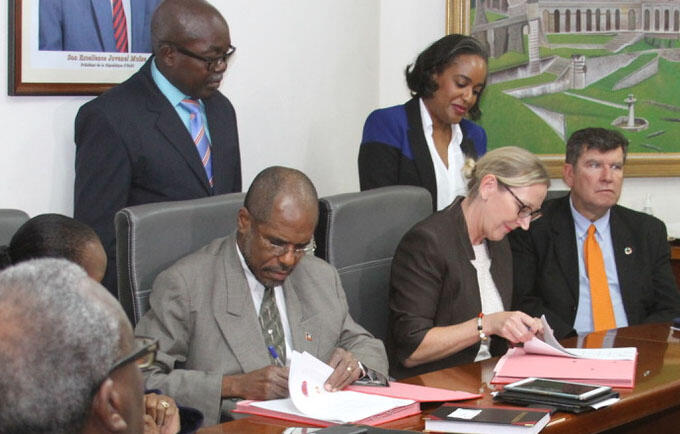Port-au-Prince, May 19th, 2017 --- The UNFPA Regional Director for Latin America and the Caribbean, Estéban Caballero, completed a five-day visit to Haiti on 18 May 2017.
One of the key events of the visit was the signature between the Haitian Government and UNFPA on the 17th May, of an agreement of the conduct of the fifth General Population and Housing Census (RGPH) that will occur in August 2018.
The official ceremony of signature was held with the presence of the UNFPA Regional Director for Latin America and the Caribbean, Mr. Estéban Caballero.
The Government of Haiti thanked the United Nations Population Fund for its support in this process, as well as the World Bank, the Inter-American Development Bank and Canada for their financial support.
UNFPA's roles would be to strengthen national capacities in the areas of data collection, processing, analysis and dissemination, and their utilization as well as in Geographic Information Systems and in census management and strategic planning, in addition to raising awareness around gender issues via specific information on "Women in Haiti".
UNFPA Regional Director, Mr. Estéban Caballero highlighted the strategic scope of the next RGPH for the development of Haiti, saying that decision-makers need a strong database to make good decisions.
According to United Nations recommendations, the country should organize population censuses every ten years. Haiti conducted its most recent census in 2003, the fourth in the country's history. Previous censuses took place respectively in 1950, 1971 and 1982.
During the visit, the Regional Director met with the highest authorities in the country, including Prime Minister Jack Guy Lafontant, the Ministers of the Economy, Planning, Health, Women's Affairs and the First Lady of the Republic, Martine Moïse.
"As a doctor, I have followed UNFPA's interventions, particularly training and deployment of midwives in maternity units and communities," declared the Prime Minister to the Regional Director, reaffirming thus the availability of his Government to work in synergy with UNFPA for the benefit of the population.
On her account, the First Lady expressed her interest in preventing early pregnancy, reiterating her determination to engage in this field, through a comprehensive education of adolescent girls.
"Based on the different meetings I have attended, I have seen a willingness to do a good job in the coming years," said the UNFPA Regional Director, stressing the need for institutional consolidation and consensus in order to have a framework for development-friendly action.
Estéban Caballero spoke to the media after a visit to the maternity unit of Petite Place Cazeau, one of the "Smile Clinics¨ of Haiti supported financially and technically by UNFPA.
The head of the maternity unit of Petite Place Cazeau, nurse-midwife Résia Pierre Pierre, has shown that the work of this institution, which has not recorded any maternal death since its inauguration in September 2012, was a success story.
For 2016, the maternity unit carried out a total of 10275 prenatal consultations. It has already realized 1057 deliveries until May 17th, taking into account the fact that 2,750 women who attend the maternity do a family planning method on a regular basis.
The Regional Director welcomed the fact that UNFPA is supporting the Department in its strategy to expand these smiling clinics across the country to significantly improve maternal and newborn health and reduce the maternal mortality rate in Haiti, which remains the highest in the American hemisphere (359 deaths per 100,000 live births, according to the United Nations).
"The visit of the Regional Director has strengthened us at UNFPA Haiti in the choices we have made, in synergy with the Regional Office and the guidelines of the Executive Director, to position Haitian women and girls, so that they have a better future," said UNFPA Representative in Haiti Marielle Sander.
During his visit, Estéban Caballero, also noted a central concern for the country to "develop its resilience to disasters and climate change so as not to suffer from future environmental hazards".
Haiti suffered two devastating disasters in seven years that have tremendously increased its vulnerability, the earthquake of January 2010 and Hurricane Matthew in October 2010.


